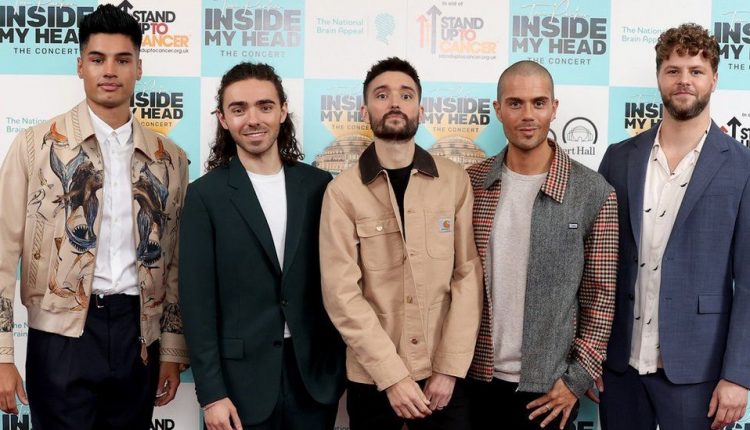Tom Parker: Brain cancer treatment needs ‘massive improvement’
The Wanted singer Tom Parker has said he’s shocked by treatment and funding for people with brain cancer.
Tom, 33, has been raising awareness for glioblastoma multiforme (GBM) since his diagnosis a year ago. He’s been getting private treatment on top of NHS care.
In a new podcast, he said a “massive improvement” is needed in treatment for brain tumours, and that a lack of research funding is part of the issue.
He added the NHS had been “great” but he wants more to be done.
GBM is the most common type of brain tumour and is also one of the most aggressive.
There’s no cure, it often resists treatment, and the average survival time from diagnosis is 12 to 18 months.
NHS treatment for people with brain cancer can include surgery, radiotherapy, chemotherapy, steroids and drugs to help reduce symptoms.
But Tom, who is also receiving private healthcare, says “there’s got to be a better answer out there than just that”.
- The Wanted reunite for Tom Parker cancer gig
- Tom Parker says tumour has ‘shrunk significantly’
- Cancer research in a pandemic: ‘I’ve done 90-hour weeks’
“He has recognised that he is in a position of privilege that other cancer sufferers are not in, and that he can use his voice and his platform to make a noise and bring
attention to the lack of funding.”
He made his comments on the podcast Chat2Amani, hosted by 23-year-old Amani Liaquat who also has GBM.
NHS treatments didn’t work on Amani’s tumour but she’s seen some small signs of the tumour shrinking since her family raised £100,000 to buy a year’s supply of a trial drug from Germany.
“It drives me insane, the world just revolves around money,” Tom said.
“There’s drugs out there that can save people’s lives – it’s so frustrating.”

Image source, Amani Liaquat
A chemotherapy drug called Temozolomide is the standard treatment offered by the NHS to GBM patients – which hasn’t changed for almost 20 years, according to the charity Brain Tumour Research.
Tom said it’s “shocking” that this hasn’t been changed in such a long time.
“I don’t want to beat around the bush about the NHS,” Tom said.
“I think they’ve been great but I think there’s a massive improvement needed in treatment for brain tumours.”
The amount of money spent annually in the UK on brain cancer research has increased from £4m in 2009-10 to £15m in 2019-20.
But data from the National Cancer Research Institute suggests that only accounts for 2% of all cancer research spending in the UK.
The charity, Brain Tumour Research, says the £15m figure must increase to £35m to address the “chronic lack of funding” for brain cancer research.
It adds that brain tumours kill more children and adults under the age of 40 than any other cancer.
A spokesman for the Department of Health told Newsbeat the government committed more than £40m of funding to brain cancer research over five years in 2018.
“We are supporting the research community working on brain cancer by funding every single eligible research request in this area and providing research training for practicing doctors,” he added.

Image source, Amani Liaquat/Brain Tumour Research
Tom said helping to increase funding for treatment and research is “the one thing” he wants to achieve by speaking out about his own experience of cancer.
He’s been praised for opening up about his experiences of cancer on social media and, most recently, in Channel 4 documentary Inside My Head.
‘Inspirational’
He also performed with the rest of the Wanted at a gig in London’s Royal Albert Hall last month to raise money for cancer charities.
It was the first time the boy band had performed together for seven years.
Amani told Radio 1 Newsbeat that Tom is “inspirational” for speaking out.
“It is so easy in these horrible situations to just curl up and hide,” she said.
“He has recognised that he is in a position of privilege that other cancer sufferers are not in, and that he can use his voice and his platform to make a noise and bring attention to the lack of funding.”


Comments are closed.